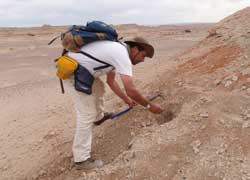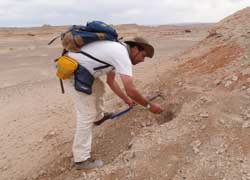 KINGSTON, R.I. – April 1, 2014 – Paleontologist David Fastovsky, a professor of geosciences at the University of Rhode Island, has been awarded a Fulbright scholarship grant to study the environmental conditions that existed in Europe when the dinosaurs went extinct.
KINGSTON, R.I. – April 1, 2014 – Paleontologist David Fastovsky, a professor of geosciences at the University of Rhode Island, has been awarded a Fulbright scholarship grant to study the environmental conditions that existed in Europe when the dinosaurs went extinct.
Fastovsky has spent most of his career studying the Cretaceous-Tertiary boundary, the period of time when the non-avian dinosaurs went extinct 65 million years ago.
“My whole career has been devoted to understanding the environmental transition going across the boundary,” said Fastovsky, a resident of Wakefield. “When the dinosaurs went extinct, did they go gradually or quickly? To understand that, you have to understand the processes of sedimentation and the environment in which their bones are preserved, or you can’t assess what the distribution of those bones in time really means. That’s what we’re after.”
He published a paper in 2005 that summarizes what is known about the extinction of dinosaurs in North America, and now he wants to learn what he can about the situation in Europe at the time of the extinction.
“There are no meaningful data about this period from anywhere else in the world except North America. But we know there are locations in Spain and France that contain dinosaurs at the boundary. I want to see what we can learn about the distribution of fossils there,” he said.
The URI professor will spend the first eight months of 2015 in Europe, teaching at the University of Vienna and the Viennese Museum of Natural History, conducting fieldwork in France and Spain, and analyzing samples.
“I’ll be measuring and studying the sedimentary rocks, observing features in them, and reconstructing the ancient environments,” Fastovsky explained. “It might look like a bunch of rocks to most people, but to me I’ll be looking at the relics of ancient ecosystems.”
Fastovsky is quoted regularly in the news about fossil discoveries, and he made international news in 2011 with a paper he wrote describing the fossilized remains of a nest of 15 juvenile Protoceratops in Mongolia, revealing new information about postnatal development and parental care. The 70 million-year-old nest was the first ever found for the genus and the first indication that Protoceratops juveniles remain in the nest for an extended period.
“Finding juveniles at a nest is a relatively uncommon occurrence, and I cannot think of another dinosaur specimen that preserves 15 juveniles at its nest in this way,” he said.
Fastovsky earned a master’s degree in paleontology from the University of California-Berkeley and a doctorate from the University of Wisconsin-Madison. He joined the URI faculty in 1986 and serves as the chair of the Department of Geosciences. He is the co-author of Dinosaurs: A Concise Natural History and The Evolution and Extinction of the Dinosaurs.
This is his second Fulbright grant. His first grant was awarded in 2004 for the study of fossil deposits in northeastern Mexico.
The Fulbright Program is the flagship international educational exchange program sponsored by the U.S. government and is designed to increase mutual understanding between the people of the United States and the people of other countries. Recipients of Fulbright grants are selected on the basis of academic or professional achievement, as well as demonstrated leadership potential in their fields. Established in 1946, the program operates in more than 155 countries worldwide.
Photo courtesy of David Fastovsky

